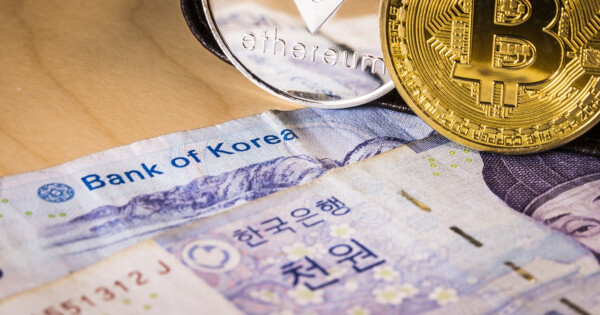Bank of Korea Acquires Samsung-Backed BankSign Blockchain Platform, Seeking to Deploy the Platform at Local Banks
Nicholas Otieno Jul 15, 2020 13:00
Bank of Korea makes a huge step in acquiring Samsung-backed BankSign authentication certificate service. The central bank seeks to deploy the blockchain platform in local banks.

The Bank of Korea has signed a memorandum of understanding with the Korea Financial Settlement Service (KFSS) to take over the management of BankSign blockchain authentication certificate service.

In 2018, the Korean Federation of Banks collaborated with Samsung SDS, a subsidiary of Samsung Group to launch the BankSign to offer blockchain solutions to local banks.
The BankSign is a blockchain-based authentication service designed to transform mobile and online banking by enabling faster and secure verifications.
With confirmation from one bank, the blockchain service enables users to carry out multiple account transactions across different banks. The service is recognized as a gamechanger not only for the banking industry but also for the mainstream blockchain adoption rates in the country.
The Central Bank Responding to Change
On 13 July 2020, South Korea’s central bank announced acquiring the Samsung-backed blockchain authentication services for the further use case of the blockchain platform in the Korean banking industry.
The BankSign blockchain platform is set to replace the “digital ID” (DID) system being used by banks in the country. Although the digital authentication certificate service is integrated into many banking and government services, it fails to offer proper services to clients because of several flaws in it.
Based on the partnership, both the Bank of Korea and the KFSS plan to completely replace the digital authentication service by BankSign by the end of 2020.
A bank representative mentioned: “I expect through that collaboration, we will be able to realize cost reduction, service improvements, and discovery of new businesses,” with the assistance of resources provided by the MOU.
The new system is expected to significantly enhance user experience with value-added services, reduce operational costs, and help banks to discover potential and new revenue streams.
The coronavirus pandemic has rapidly increased the demand for mobile and online banking services as a means to avoid face-to-face contact. The BankSign blockchain platform automates several mundane manual tasks like documentation management, payment settlements, and data consultation, hence paving the way for a digital future.
South Korea Seeking to Bring Crypto to the Mainstream
South Korea continues to be a vital market for cryptocurrency. As a result, authorities have been making recommendations to consider legislation to bring crypto-assets into the mainstream. South Korea’s parliament recently put forward a bill that could see cryptocurrency profits taxed by up to 20%. However, after years of discussions, the government is expected to announce comprehensive details of how to tax crypto transactions.
South Korea is not the only country seeking to revise its tax law to cover cryptocurrencies. Australia, the UK, and the US all tax cryptocurrencies as assets. By developing a proper regulatory framework, South Korea is, in the long-run, positioning itself to benefit from new regulated markets. The legislation aims to help bring crypto-related activities in South Korea in line with the FATF’s requirements to prevent terrorist financing and money laundering by making rules for crypto transactions and requiring companies to adopt greater accountability.
Image source: Shutterstock
.jpg)